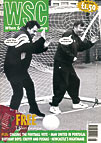 Robbie Fowler was fined for supporting the sacked dockers in Liverpool, but what does this mean for football?
Robbie Fowler was fined for supporting the sacked dockers in Liverpool, but what does this mean for football?
As a symbol of where football’s priorities appear to lie in the 1990s it could hardly be bettered. Within days of Robbie Fowler unveiling a T-shirt proclaiming support for sacked dockers during Liverpool’s Cup Winners’ Cup match with SK Brann, UEFA impose a £900 fine as punishment for a gesture which apparently constituted “a manifestation of a non sporting nature”.
Granted, the Mersey Docks and Harbour Company were probably offended – but when did the European football union decide that they had a duty to protect the sensitivities of a group of British businessmen? And while there might have been mutterings in the Anfield boardroom afterward, it’s hardly likely that anyone in the crowd that night would have found fault with the message, still less been motivated to misbehave as a consequence.
That a statement of support for dock workers at a football match should cause controversy is quite an irony in view of professional football’s roots in working class communities. Indeed, dockers once formed the bedrock of the support of clubs such as Millwall, Grimsby and Portsmouth as well as swelling the crowds of the big city sides in Liverpool and Glasgow. To pick just one example from overseas, Argentina’s most popular club, Boca Juniors, was formed among Italian immigrants in Buenos Aires docks (and famously took their colours from the ensign on a Swedish cargo ship). If football clubs and footballers themselves are to continue to mean something to the communities from which they have come, it’s important that they are not prevented from reflecting the concerns of those communities.
UEFA might argue that there is a precedent for their acting upon ‘political’ messages, but there has been precious little consistency – Norwegian players were fined for carrying a banner protesting against nuclear tests in the Pacific before a friendly match with France two years ago, yet members of the Swiss national squad escaped censure for a similar gesture (or perhaps UEFA feel disposed to overlook what happens in their own backyard).
You’d expect, too, that expressions of a “non sporting nature” might include the open display of neo-Nazi regalia, yet UEFA appear to turn a blind eye whenever Real Madrid’s hardcore fans, the Ultra Sur, display swastika banners, as they did during Champions League fixture with Ajax a couple of years ago, images seen all around Europe. Or perhaps it’s just that Nazi connections are not seen as incompatible with football these days. AC Milan’s Silvio Berlusconi, the doyen of ‘modern thinking’ football club owners, was, after all, prepared to form a coalition government with help of the far right MSI, who can count the volubly racist factions at Lazio and Inter among their most ardent supporters.
In fact, as UEFA know only too well, every football match played under their auspices is a vehicle for “non sporting” messages to the extent that the game could not survive, in its present form, without them. Billions are spent each year in an effort to associate products with sporting success, whether they are pitchside endorsements for Coca Cola or Fuji or beer company logos splashed across players’ chests. And many of the companies with which football is associated are avowedly political organizations in themselves, contributing to party funds or in some cases even dictating government policy.
The first leg of Liverpool’s quarter-final graphically demonstrated the lack of hard and fast rules in this area. Sponsored by Carlsberg, they played in plain shirts for the game in Bergen, in order to conform to Norway’s strict laws on alcohol advertising. Alcohol is a huge issue in Scandinavia and elsewhere in Europe, while other countries deem it to be non political. And what of West Brom, sponsored for a season by an anti-smoking campaign? Should Imperial Tobacco have lobbied FIFA to have the Baggies fined every time they stepped on the pitch?
“Comments on matters outside football are not acceptable on the field of play,” says Roy Evans in the wake of the Fowler incident, or even, he might have added, off the field of play, where players are expected to inhabit a narrowly defined world of sponsorship opportunities, endorsing whatever is placed in front of them from electric razors to isotonic drinks.
The more it seems that players are expected to have their choices, in effect their opinions, shaped for them – they’ll drive the car they’ve been given, they wear the clothes they’re paid to model – the greater the shock waves when one of their number steps out with an opinion all of their own that doesn’t seem to have been worked out in advance by an image consultant. As long as it is paid for, and doesn’t breach the laws of the country you’re playing in, plug what you like on your shirts. Do something for free that can arbitrarily be dubbed more ‘political’ than anything else, then expect a fine.
Steve McManaman, whose idea it had been, said afterwards, “We’re not arrogant enough to believe that by wearing a T-shirt we will make a difference.” UEFA, however, seem terrified that they might.
From WSC 123 May 1997. What was happening this month